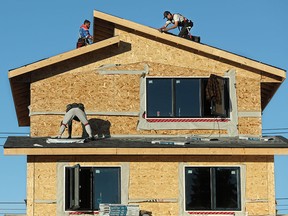Cutting the taxes and regulation that stifle development would allow Canada’s world-class developers to build quickly
Article content
We continually hear from various levels of government about the latest programs, subsidies and other plans to deal with the housing crisis, but they always target symptoms, not the cause. And the source cause of Canada’s housing issues is straightforward: excess taxation and intense regulation on construction, which limit supply and elevate cost.
Article content
Article content
We tax and regulate the things we want to discourage: cigarettes, alcohol, gas and surprisingly, housing. In 1980, when I added a 10×10-foot breakfast addition to my 1940s home, a permit cost $25 and took one day. Today, one would be exposed to public hearings, thousands of dollars for architects, lawyers and consultants and a process of a year or more.
Advertisement 2
Article content
Housing in Canada is in crisis because demand has simply outpaced the supply of new homes. Peak housing starts occurred in 1976, when 273,000 new homes were delivered — to a population of some 23.5 million people. Today, with 41.5 million Canadians, we are still below that peak. It is why Canada has the fewest homes per capita in the G7, 25th in the Organization of Economic Co-operation Development (OECD).
Prices rise when demand exceeds supply, . It’s a law of economics. Added to this imbalance is the cost burden of excess taxation and regulation on new home construction, which gets passed on to the buyer or renter.
Today in Toronto, about one third of the cost of all forms of new housing is taxes, fees, levies, etc., from all three levels of government, while purpose-built apartment buildings get an HST exemption. If all these charges on construction were waived, required rental rates would drop by one third, making many stalled residential projects viable and adding new supply at a reduced cost. When new supply is added, the price of older rental stock also drops.
The concept of waiving development fees, taxes and levies on construction has raised the concern of pressure on municipal finances, but this is largely a timing issue. The creation of resultant property tax income streams is more valuable to municipalities than one-time development charges.
Article content
Advertisement 3
Article content
By waiving one-time taxes and fees on new housing, we can accelerate construction and expand our property tax base to generate far more tax income than with underdeveloped land. In many countries, municipalities will provide tax increment financing to incent construction to realize the resultant property tax benefit, which continues forever.
In Toronto, it is exactly the opposite: high taxes on construction stall the creation of new housing to everyone’s detriment, putting the focus on one-time fees versus the far greater multi-generational income streams from enhanced property taxes.
Regulations also have a leading role in reducing supply and increasing cost. A typical project takes three or four years from land assembly to construction start, with entitlement costs in the millions and millions more for the delays. All of this adds cost borne by the homebuyer or renter.
The federal election has brought a sharp contrast in approach by the Conservatives and Liberals. The Conservatives have focused on eliminating taxation and addressing regulation to unleash the private sector, which has the scale, skills and capital to execute.
Advertisement 4
Article content
By giving the industry permission to build and reducing the construction cost burden, the private sector will respond with far greater new home supply delivered. This will result in accelerated supply with reduced cost of new incremental housing, which will impact everyone as new supply is delivered at competitive cost, another law of economics.
The Liberals have announced that they intend to get into the development business to build housing. Do we really want the federal government, with its regulatory overburden, becoming a developer? If one looks at the disastrous state of their housing initiatives on our military bases and Indigenous reserves, perhaps the federal government should focus on finishing that promise first.
So, if we want housing that is more affordable, voters need to send a clear message to our politicians. Let’s unleash our world-class development industry, not have the government try to recreate it. Let’s give permission to the thousands of developers across the country to get at it, with a simple three-step course of action:
- Eliminate all taxes, levies and fees on the construction of all forms of new housing.
- Overhaul the regulatory process to give permits within six to nine months.
- Incent builders to build, with the aim of expanding the property tax base.
The good news is that our housing crisis is a result of bad public policy. The better news is that it can be fixed with enlightened policies that unleash Canada’s world-class development industry. Change is needed — now.
Recommended from Editorial
Jon Love is the executive chair and founder of KingSett Capital.
Article content
Canada’s housing crisis has simple solution: cut taxes and regulation
2025-04-02 11:20:56





